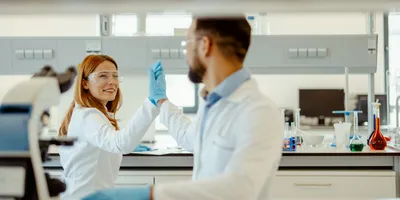To thrive, humans require social connections and trust-based relationships. This is true for our work lives as much as for our lives away from work. Well-being expert Mandy O’Neill, PhD, lists companionate love, or having a best friend at work, as one of the five requirements that organizations need to foster well-being at work. Lab work can seem individual and isolating at times, with each scientist busy completing their portion of the workflow or puzzling over technical challenges, but modern science is complex and best viewed as a team sport. The teamwork required helps foster the environment needed to build strong, positive relationships in the lab. Here are three things that lab managers can do to help them build positive relationships:
#1 – Communication and empathy
Being a good communicator begins with effective listening. Invest time and attention into the people around you. Get to know them by listening to their stories and learning about their lives. Be an empathetic listener. Listen for feelings as well as words. When speaking, be open and honest, and be vulnerable by sharing important parts of your life journey. Share your time, ideas, and experience. Look for opportunities to participate in positive communication. Learn to be a better communicator, because as Julian Mirivel, PhD, says, “When you improve your communication, you improve your relationships.”
#2 – Trust and reliability
If you want to be trusted, be trustworthy. Be dependable. Ensure that your actions support your words, that you deliver on your commitments, and that your word is good. Show people that they can count on you and that their trust in you is warranted. No one is perfect. When something goes wrong or mistakes are made, be upfront about the outcomes. Take responsibility for your actions and decisions. This level of vulnerability helps build emotional and psychological safety in the lab and serves as a model for staff.
#3 – Appreciation and support
People need your appreciation and support. It is vital that the people in the lab understand that you recognize them as people, not resources. They are the root of the lab’s success, not rows in a budget spreadsheet. Acknowledge their effort and celebrate their success. It can be as simple as thanking them for a positive action or outcome. Everything around the lab gets better with a little gratitude. Be willing to lend a hand, an idea, or some constructive feedback to help staff overcome the challenges of their science. Normalize asking for help to improve teamwork and build a culture of success in the lab.
Building positive relationships for yourself around the lab will provide significant benefits. Even more important will be your willingness and ability to teach this skill to others. Show staff how to communicate, build trust, and show appreciation. Ingrain these behaviors into the lab's culture. The network of positive relationships that grows from these efforts will transform the lab, unlocking the staff's potential to do great things.












